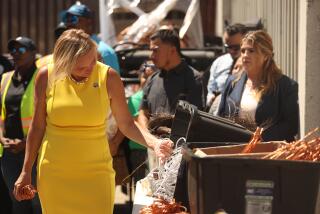United Cable Fine May Go to Improving Access
- Share via
United Cable, fined $300,000 for delays in establishing service to the east San Fernando Valley, may end up applying its fine directly toward improved public access services at the station.
The Los Angeles Telecommunications Commission voted Friday to review a proposal for spending the money on either additional full-time staff or interns to work on providing improved public access broadcast quality. Public access channels, on which the public can appear free of charge, are required of local cable franchises by the City Council.
If the commission decides to make the proposal official at its next meeting Nov. 17 and if the plan is ultimately approved by the council, it will be the first time that the city has applied fines against a cable television company directly to improving that company’s service.
In the past, fines have gone to a general fund used citywide at the discretion of the Department of Telecommunications. But the council decided earlier this fall to make sure that East Valley residents who suffered because of the cable delays would benefit from the fines.
One proposal was to offer rebates to customers. But David Hankin, chief of the regulatory bureau of the telecommunications department, said commissioners expressed a desire Friday to do something with lasting impact.
“They felt a one-time rebate really wouldn’t have an impact,” he said. “It would just go away.”
Still to be determined Nov. 17 is whether the money would add people to United Cable’s staff or whether an independent public access corporation would be formed to augment public access at the station.
United Cable promised to complete the Valley system within two years when it won the franchise in 1983. But lines were not extended into all of the East Valley until May.
Over the years, United Cable has been fined more than $1 million for delays, nearly half of which was waived after company officials persuaded council members that they had misunderstood some of the city’s regulations. So far, the company has actually paid $236,200.
More to Read
Sign up for Essential California
The most important California stories and recommendations in your inbox every morning.
You may occasionally receive promotional content from the Los Angeles Times.













